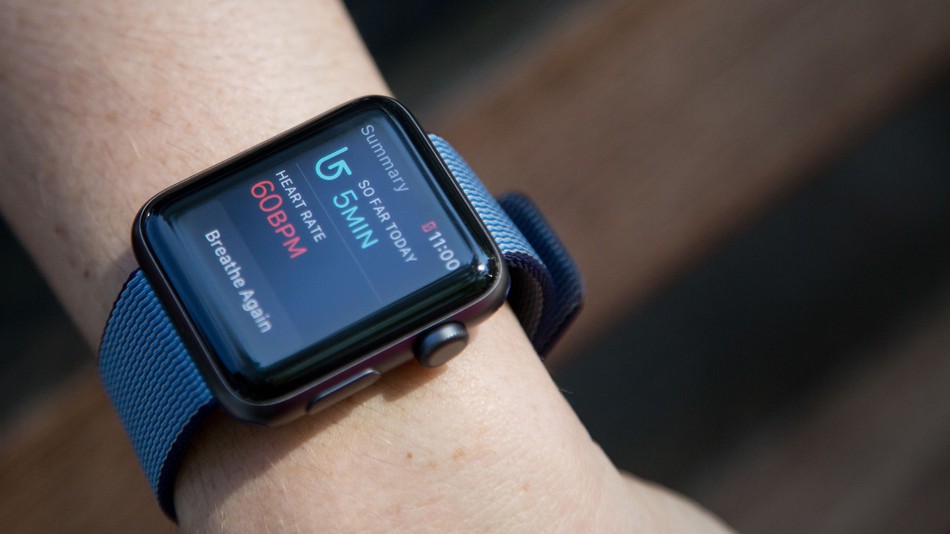Common Conceptions has wearable fitness tech pegged as step counters and sleep trackers or if you splash out the big bucks a heart rate monitor. But according to new research, strapping on those small gadgets could do more than simply track vital functions, it could reveal life-saving health information.
A recent study presented at the Heart Rhythm Society conference by Dr. Greg Marcus, the director of Clinical Research for Cardiology at the University of California San Francisco (UCSF), endeavored to find if an Apple Watch was sensitive and accurate enough to detect atrial fibrillation, a common heart condition.
In fact, atrial fibrillation, also called AFib or AF, is the most common heart abnormality with at least 2.7 million suffers in America alone, according to the American Heart Association (AHA). The abnormality causes the top chambers of the heart, called the atria, to spasm irregularly rather than strongly pump in a regular rhythm.
Because the body’s blood isn’t being pumped they way it should, it can sit in the heart instead and start to clot. With this higher risk for clotting comes a higher risk for strokes in people with AFib. According to the Center for Disease Control (CDC), the risk for stroke can increase as much as times compared to those with regular heartbeats.
There are other condition risks that increase with the clots that come as part of AFib, including dementia, heart attack, and kidney disease.
The condition is treatable, usually with blood thinners, but the condition can be a difficult to diagnose. Often, AFib is intermittent meaning that it won’t always be present or detectable when the doctors run the tests.
“There are monitors that have gotten easier for patients to wear,” Marcus explained. “But generally, they don’t monitor for more than two to four weeks. So again, if they don’t have that atrial fibrillation in those four weeks, you’re not going to catch it.”
Those monitors are only used when atrial fibrillation is already suspected. Dr. Marcus wanted to discover if something many people are already wearing, like a smart watch, could detect the irregularity when it happened, no matter when it happened.
To do this, Dr. Marcus paired up with the team behind Cardiogram, an app already available for the Apple Watch, which analyzes the heart-rate data of users. Next, they needed to teach the app to spot AFib activity. They had to create an algorithm which could make the difference between a regular and an irregular heartbeat.
In order to achieve this, the researchers from USCF obtained two test groups using their database of patients from the Heart eHealth Study,
“This is a study that any adult can enroll in. We have more than 100,000 signed up,” Marcus says. “We hope that it will be a really valuable resource to help understand heart disease, potentially prevent heart disease, identify new targets for therapies for heart disease.”
From this database, they were able to find 166 patients with atrial fibrillation and an Apple Watch for the first test group. These participants were also given an AliveCor, a portable EKG monitor. Dr. Marcus’ team were already familiar with the device and knew that it could already accurately detect when AFib occurred. The researchers used the data from AliveCor to teach Cardiogram what AFib heart rate data looks like.
The second group was composed of patients who visited UCSF for cardioversion. Dr. Marcus explained the procedure: “This is a very common procedure to shock people out of atrial fibrillation,” Marcus says. “It’s not like in, you know, TV shows, although we do yell ‘Clear!’ before we shock. But it’s a very effective way to get people out of atrial fibrillation.”
In order to collect data before the shock, during the AFib, and just after the treatment, post AFib and with a normal heartbeat, this second group was also outfitted with an Apple Watch. Dr. Marcus explained why the study needed two groups of patients: “In the training set, we used AliveCor. This second group undergoing cardioversion was the validation set—the reference standard, measured with the conventional 12-lead [12-wire] EKG that we use in the office.” Surprisingly, after comparing the application’s detection with the traditional EKG measurements and detection, the Apple Watch detected AFib with incredible accuracy.
“The app was able to detect or discriminate a-fib from normal rhythm with 97% accuracy,” Marcus says. “Now, critics will very fairly point out that not everybody has a smartwatch,” he adds. “And that’s a limitation that’s really important to mention. But I think that these watches and this technology are going to become more and more common.”
However, the AFib detecting smart watch app isn’t ready for primetime yet. “There are quite a few additional hurdles we need to jump before we successfully roll this out,” Marcus says. “First, we need to figure out how to do this in a way that’s not going to unnecessarily alarm people who don’t have the disease. That’s often an issue in medicine—identifying the people with the disease without too many false positives.
“Second, in this study, we were only studying people we know had atrial fibrillation. So what we’d like to do is prove that, yes indeed, we can identify someone who previously didn’t know they had it. So there’s quite a bit more to be done, but we’re working hard on it.”
So, not today but someday soon this app could aid in reducing strokes and death in people with atrial fibrillation. And while this is a good first step, this study has merits of its own — it managed a marriage of health and technology without interrupting the daily lives of its test subjects. “Even the highest caliber studies generally are conducted in some study facility, some hospital, a place outside that participant’s natural environment. It’s not their home, it’s not their work, it’s not while they’re asleep,” says Dr. Marcus. “But this is an extraordinary opportunity to capture real-time, real-life data that is dense. It’s continuous. And it reflects what’s going on in natural environments.”
AFib; Atrial fibrillation (AF or A-fib) is an abnormal heart rhythm characterized by rapid and irregular beating. Often it starts as brief periods of abnormal beating which become longer and possibly constant over time. Most episodes have no symptoms. Occasionally there may be heart palpitations, fainting, lightheadedness, shortness of breath, or chest pain. The disease is associated with an increased risk of heart failure, dementia, and stroke. It is a type of supraventricular tachycardia.
More News to read
- What Do We Know About The New Planet in Our Solar System?
- This Startup Wants to Translate Your Own Voice into Another Language that You Can’t Speak
- This Startup Might Become the Tesla of the Electric Motorcycles
- Walmart is Playing Dirty, Warns Tech Partners Against Amazon
- The Change of The Power Grid, Thanks to Elon











